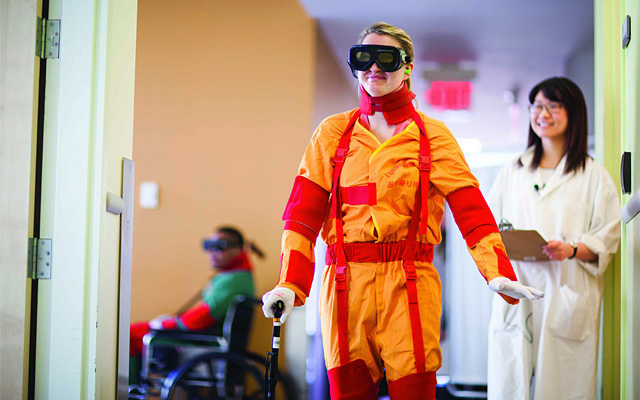Feature Story

Program trains next generation of geriatric professionals
February 27, 2015
TORONTO – A new geriatric training course developed by The Michener Institute for Applied Health Sciences, in partnership with Baycrest, aims to prepare the next generation of healthcare professionals for the unique needs and care challenges of older patients.
Working With Seniors: A Primer for Healthcare Providers is available to students enrolled in Michener’s applied health sciences programs who go on to careers in fields such as Diagnostic Imaging (DI), Nuclear Imaging (NI), Medical Radiation and Respiratory Therapy.
The program brings together Michener’s expertise in responsive curriculum design and development with Baycrest’s expertise in geriatric care and aging brain research, creating a one-of-a-kind education experience for young professionals embarking on careers in healthcare.
Currently, about every second patient admitted to hospital in Ontario is a senior. Education and skills development are needed to help this population, which is growing in size.
The intensive week-long training – now incorporated into Michener’s summer semester – combines flexible learning formats, such as e-learning modules, with simulation experiences such as interacting directly with seniors, observing and participating in scenarios, and wearing an innovative frail aging simulation suit. The curriculum is designed to provide students with first-hand perspective and experiences of the challenges seniors often encounter during medical appointments.
Members of a seniors’ advisory council from a local community health centre provided input for the content, along with a seniors’ acting troupe known as ACT II. The actors participated in role-playing, real-world patient and professional caregiver scenarios for students to observe and engage in directly.
“The competency framework for this new program starts with the seniors’ voices,” said Gillian Nichol, director of continuing education and project lead with the Working With Seniors program at Michener. “This really is a ‘patient’s first’ approach, and respects the opinions and perspectives of seniors as experts in their own care, reinforcing the whole concept of ‘nothing about me without me’.”
Results from the first cohort of 270 full-time students who took the program last summer were encouraging. Nearly all of the participants reported that their knowledge and understanding of seniors had improved considerably. This included greater awareness for respecting seniors’ autonomy, creating senior-friendly environments, and being adaptive and responsive to the individual needs and wishes of seniors.
“It was an eye-opening experience,” said Elizabeth Pickles, a medical laboratory sciences program graduate, now in her clinical placement in Ottawa. “It reinforced the importance of customizing your approach around the needs of each patient.”
Michener has now integrated the program permanently into its curriculum so that all students will enter their chosen career fields with basic competencies in working with seniors in a healthcare setting. Michener and Baycrest hope to extend the curriculum to Michener graduates, and general entry-to-practice healthcare professionals in the future.
“Our mandate is to be a responsive provider of educational solutions that meet current and emerging needs within the health system,” said Maureen Adamson, president and CEO, The Michener Institute. “We are proud to be working with Baycrest to educate future healthcare professionals on the importance of understanding the unique healthcare needs of people as they age, an important part of providing patient-centred care and contributing to a sustainable healthcare system in Ontario.”
“This has been a truly gratifying partnership utilizing our mutual strengths,” added Dr. David Conn, vice-president of education at Baycrest, and co-chair of the Canadian Coalition for Seniors’ Mental Health. “Together we’ve created a leading educational product that will help cultivate the clinical knowledge and skills required of health professionals caring for seniors.”
